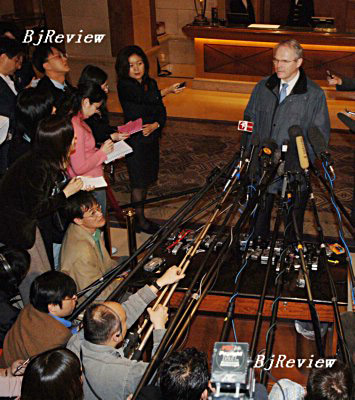
The fifth round of the six-party talks concluded on February 13 in Beijing amid loud applause. For all the widespread optimism, experts remain prudent about the painstaking, time-consuming talks aimed at resolving the North Korean nuclear issue. In the following two articles, Shi Yongming, a scholar at the China Institute of International Studies, and Zhang Liangui, a professor at the Institute of International Strategic Studies, Party School of the Central Committee of the Communist Party of China, delve into the obstacles and challenges that still lie ahead.--Ed.
The atmosphere among the six parties-the United States, North Korea, China, South Korea, Japan and Russia-discussing the Korean nuclear issue warmed up with the advent of spring. They completed the third phase of the fifth round of the widely watched talks in Beijing shortly before the traditional Chinese Spring Festival.
Despite the gratifying progress, a prominent problem has stood out. The talks dragged on for one more day because of a seemingly trivial issue-the amount of energy compensation to be given to North Korea.
While having few differences over principles, the parties got stuck by a simple mathematical problem. U.S. chief negotiator Christopher Hill indicated that he did not know what North Korea's real purpose was. Indeed, this is a perplexing question.
If we review the development of the Korean nuclear issue, we will see that not only North Korea, but also the United States and Japan, do not have a clear aim in the talks. For all the flexible policies that the United States adopted to persuade North Korea to take steps to abandon its nuclear programs, it is still uncertain about the overall objective of the negotiations. Japan linked the nuclear issue with North Korea's abduction of Japanese citizens, adding to the difficulty of the talks.
The United States imposed even severer financial and economic sanctions on North Korea after the fourth round of the six-party talks produced a joint statement that North Korea viewed as posing a grave threat to its survival. For Pyongyang, this was an unreasonable move. Given this "unfair" treatment, it assumed that the purpose of the United States was not as simple as demanding that North Korea give up its nuclear programs. As a result, it responded to the U.S. sanctions with a nuclear test. After that, the mistrust between the two countries peaked. Pyongyang suspected that Washington intended to topple North Korea's political regime, whereas Washington thought that Pyongyang wanted to possess nuclear weapons rather than to trade its nuclear programs for security and economic interests.
During the latest talks, North Korea agreed to take actions toward denuclearization. That's mainly because North Korea and the United States held meetings to address the financial sanctions in Berlin in mid-January and in Beijing at the end of January. Although what was discussed was kept confidential, it is obvious that the United States gave consideration to North Korea's legitimate interests at the meetings. However, as they failed to resolve the problem in their bilateral negotiations, North Korea was reluctant to make further commitments in the ensuing six-party talks.
| 